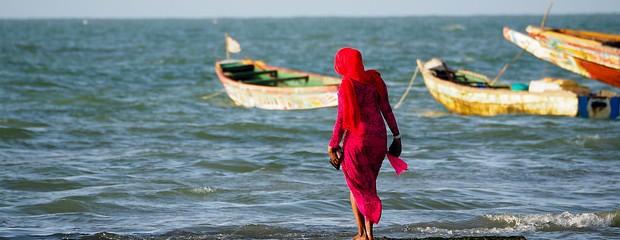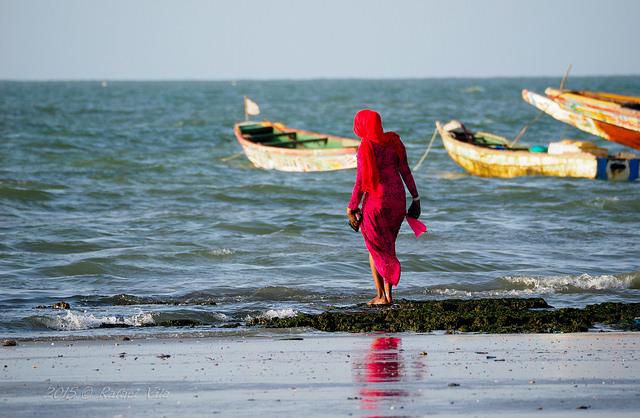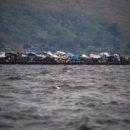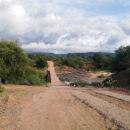Between a rock and a hard place: Gambians tackle Fortress Europe

The number of Gambians seeking asylum in Europe nearly quintupled between 2012 and 2014. The fact that most are turned away as ‘economic migrants’ speaks to the inadequacy of the EU’s distinctions.

On the coast of the Gambia. Credit: Rafael Vila.
In the humid noon heat of Dakar, Senegal, Isa* sits in a small room with a fan slowly spinning overhead. He is calmly and deliberately recounting his experiences fleeing the Gambia, the tiny river-based nation on the West African coast surrounded by the ocean to the west and Senegal to the east.
Isa is one of thousands of Gambians who have left their country in the last two years, the majority taking the so-called “back way”, the name locally given to the clandestine Central Mediterranean route via Libya to the European Union.
The Gambia has a long history of migration. It has deep diaspora links in Europe and remittances make up 20% of national GDP. Yet the number of Gambians claiming asylum in Europe has soared recently, increasing 371% between 2012 and the beginning of 2014. In 2015, the number of Gambian asylum applications remained at a record high with 12,205 asylum applications across the EU, with Gambia ranking third in the list of nationalities claiming asylum in Italy at the end of 2015.
However, out of the 6,365 decisions on asylum applications lodged by Gambians in Italy in 2015, 63% were outright rejected. The high rejection rate illustrates how EU member states largely see Gambians as economic migrants rather than refugees, a critical distinction for European refugee policy today.
The deteriorating economic situation in the Gambia has undoubtedly played a central role in Gambian flight. Between 2013 and 2014, economic growth contracted from 4.3% to 0.9% due to a combination of external factors and internal policy slippages. For example, the late arrival of summer rains in 2014 led to a 15% decline in crop production, with serious implications for food security and real GDP in a country where 70% of the population relies on agriculture.
However, while economic factors are very real, the huge increase in migration out of the Gambia is an indicator of acute underlying problems that reach far beyond economics, as Isa’s story demonstrates.
Fleeing the Gambia
As he speaks, Isa touches the uneven break in his left arm from when he was kidnapped from the streets of Banjul by masked men, blindfolded, and driven to a secret location where he was detained, tortured and left for dead in a nearby forest. He speaks of the framed photograph of President Yahya Jammeh – the country’s mercurial leader who came to power in a bloodless coup 22 years ago – he glimpsed in the corridor as his torturers left him chained to a chair and bleeding.
Isa was a journalist and managed to flee across the border into Senegal after his abduction. Many who escape the country continue north to Europe, but Isa was one of 35 Gambians in 2014 to apply for asylum in Senegal. As he tells his story, you can tell he’s had to repeat it many times as he’s moved through the country’s highly inefficient system. In fact, he has been waiting for over a year with no support from the state and the daily fear that Jammeh’s agents will filter across the porous border and find him.
Persecuted because of his reporting, Isa was most likely tortured either by the National Intelligence Agency (NIA) or the paramilitary group known as the “Jungullars”. Both groups are much feared throughout the country and are under the direct authority of the presidential office as part of a repressive state apparatus deployed to quash dissent against Jammeh and his Alliance for Patriotic Reorientation and Construction party.
Human rights violations have been well documented and incommunicado detention, extrajudicial killings, arbitrary arrests, and reports of torture are common for those who speak out against the president. Leading opposition member Solo Sandeng of the United Democratic Party was found dead in state custody just last month.
The introduction of new legislation that has legitimised the penalisation of dissident voices has exacerbated abuses, and state-led violence threatens to worsen with the upcoming presidential elections in December. The Information and Communication Act (2013) allows the state to imprison journalists such as Isa for up t0 15 years for “spreading false information”. Furthermore, reporters who cover opposition party rallies have disappeared, while family members of those persecuted are often intimidated into giving information, which could further criminalise their loved ones or risk facing violence themselves.
For example, Binta was intimidated for months after her husband, a military officer persecuted by the regime, escaped the country. “Jammeh knew our family…my husband fled across the border to Senegal. I could not join him because [Jammeh’s] spies were watching me”, she says. “The Gambia is a small country.” Eventually, Binta was called to the presidential offices where she says she was drugged and raped. Afterwards, she managed to flee across the border where she too lives in a state of constant fear.
“Everyone is scared of Jammeh – all the ministers”
Young men like Isa are the typical profile of sub-Saharan African migrants arriving in the EU, some of whom are registered at the EU’s experimental “hotspot” system on frontline member states, such as on the Italian island of Lampedusa. In theory, each asylum application must be judged on an individual basis. But in practice, with the hardening of public opinion against refugees and member states’ desperate attempts to regain control of Europe’s external borders, the vast majority of irregular migrants from the African continent are being excluded from the right to claim asylum.
Hotspots, originally designed to fast-track asylum applications and speed up relocation within the EU, have now been turned into detention centres. Devoid of constitutional protection, Gambians are being rapidly deported without consideration for their claims. This is based on the perception that the Gambia, with its white sand beaches and millions of Euros of aid, is a safe country.
This reasoning puts it that any migrants from the Gambia must be “economic” migrants and thus not eligible for asylum. The experiences of Isa, Binta and many others tell a different story. But even when there may be significant economic dimensions behind people’s flights, these concerns are inseparable from the political realm. The level of poverty in the Gambia can be directly linked to governance failures and, in turn, a lack of democracy under Jammeh.
The government’s reliance on domestic borrowing, which was up to 50% in 2014, has fuelled inflation and limited private sector access to credit from commercial banks, affecting ordinary Gambians and severely depressing the economy. Meanwhile, in May 2015, the Office of the President issued a directive imposing an exchange rate overvalued by 30%, placing Gambia’s external viability and fiscal sustainability at risk. Although the IMF repeatedly called for a reversal of the directive, Jammeh only did so in January 2016 with only two months of imports left in the Gambian Central Bank. With the economy brought terrifyingly close to the brink of collapse, it is testament to the fear with which Jammeh rules that not one of his ministers was able to prevent the oncoming disaster.
“[The President] is stubborn [and] everyone is scared of Jammeh – all the ministers”, said a source from an international bank that provides aid packages to the Gambia, speaking on condition of anonymity.
Although many Gambians claiming asylum in the EU do not fit the narrow criteria for refugee status under the 1951 Refugee Convention, the distinctions between a refugee facing political persecution and other irregular migrants fleeing the suffocating grip of economic and political oppression are becoming increasingly difficult to maintain.
At the same time, the EU is turning to increasingly restrictive migration policies, leaving vulnerable people like Isa and Binta trapped between a rock and a hard place – they can either remain in countries where they do not feel safe and have few opportunities, or take the “back way” with increasingly high stakes and low prospects.
*names have been changed
Alexandra Embiricos graduated with an MSc from the London School of Economics and Political Science in 2015, and has previously worked with Asylum Aid and as a freelance journalist. The research for this article was conducted with International Crisis Group in their West African regional office in Dakar, Senegal.
[Correction (06/05/16): It was originally stated that 40 Gambians sought asylum in Senegal in 2014. On double-checking with UNHCR, the official figure is in fact 35. This has now been changed.]






I don’t imagine we’ll see any official stretching of the definition of ‘refugee’ to include economic migrants in the near future. It would likely result in greater movement, which Western nations will be unlikely to accept. However, as long as global systemic inequalities continue (greater opportunities in the global north) we will see sizable movements of human beings. With my Canadian passport I have effortlessly pursued opportunities across the globe – the pleasure and privilege of which the vast majority of humans will never experience.
The stories narrated are fictional based on these accounts ,there is no forest around Banjul and Places people can be dumped.People give stories so that they can be granted asylum.Many from the Gambia going through the back way are other nationals who have settled in the Gambia for ages.This is not due to Economic or political difficulties as you can see the amount of money invested on these journeys.Besides your contributors are only marketing the Senegalese geopolitical agenda by demonizing Gambia for their sovereign interest.He also needs to check that you have more than the amount of Senegalese on the back way not only Europe but Brazil,China ,Australia etc
Justice, I’m afraid I disagree with you. The Gambian economy has been mismanaged to an absolute halt. Unlike its neighbours, Gambia’s was the only economy in West Africa to have contracted to -0.75% from a very modest 4.3% growth in 2012. Unemployment is sky-high, even by sub-Saharan African standards. At least 22 percent of The Gambia’s active labour force is without employment, and more than 40 % of those who are employed live below the poverty line of $1.25 per day. With large extended families relying in them for food, school fees, medical bills etc, there is every reason for young Gambian men to risk death in the Mediterranean to find a better life in Europe. It’s important to be factual. Being Gambian myself, I have met my countrymen in North Africa and Southern Europe. They are Gambians, not foreigners. Please, lets speak the truth. Living in the Gambia is no bed – of-roses for the ordinary person on the street.